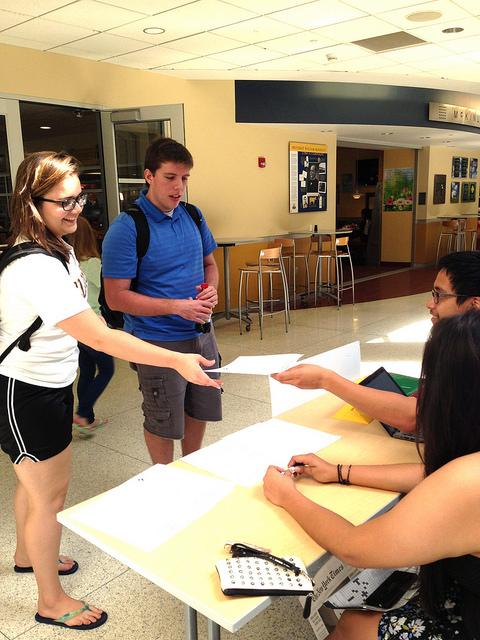MLK Mentoring Program welcomes 2015 applicants
The MLK Mentoring Program recruits new mentors every year to tutor Meadville Area Middle School students.
The Martin Luther King Jr. Mentoring Program is operating under a new director, the fourth in its five years of operation. The current director is John Christie-Searles, assistant professor of political science.
The program began under Amendia Dixon in 2011, and is a work study job for Allegheny students who want to mentor at the Meadville Area Middle School. The program typically has 15-20 mentors and the position entails mentoring twice a week for two hours each day.
Christie-Searles said that he supports the program wholly, which made him willing to fill the open space.
“I saw the need and I stepped forward and filled the vacancy,” he said. “I believe in the program, so it’s an easy thing to commit to.”
Christie-Searles said he wants to keep the program as successful as it has been in recent years, and is not sure if he will stay with it at the conclusion of the year. He does, however, believe that the program is beneficial to the mentors as well as the students they help.
“This program allows you to give back to young people,” he said. “Young people helping young people is a great thing.”
He believes that the middle school students need role models and people who care in their lives and that the mentors have potential to provide that. Moreover, he thinks the mentors can learn from the students.
Nicholas Schake, ’16, a Bonner coordinator for the program, agreed that the mentors and students can learn from each other. He recalled his time in middle school and how he thought many situations were worse than they were.
“These small things that seem like big deals might not be in a few years,” Schake said.
He believes that seeing the students worry about small things can help prevent the mentors from reacting similarly when they remember the events they used to worry about.
Schake believes that the inconsistency in the director position has been challenging for the coordinators and mentors. However, he still thinks that the program has improved since he joined it his freshmen year.
Manuel Marquez, ’16, has been involved with the program since his first semester at Allegheny. Once he became a Bonner leader, he went from being a mentor to a coordinator.
As a Bonner coordinator, Schake and Marquez’s responsibilities include recruiting new members, reviewing applications, interviewing, occasionally doing follow-up interviews and ultimately choosing new members.
“We’re not hands-on with the kids,” Marquez said.
According to Marquez, they look for passion and enthusiasm in their mentors, and he believes that they have found that drive in a majority of the mentors.
Marquez said that the two best kinds of volunteers to have are people who are passionate and nurturing toward the middle schoolers and people who have gone through their own problems and who can relate to the children.
He believes the mentors should act as a kind of support system for the students as well as an academic guide, saying the mentors are there to tutor and to answer questions about college and life in general.
According to Marquez, teachers recommend most of the middle school students to the program, but some of the students come for extra help or because they like having someone to talk to.
“Some kids just want to do homework and don’t have a great environment at home to do it,” he said.
Schake agreed that the children often want someone who thinks they are worthwhile. He believes that flexibility is an important trait to look for in a mentor because one never knows what the student is going through. A mentor who can think and act quickly in a stressful situation is ideal, particularly if they are empathetic.
He said that a mentor can get out of the program what they put into it and he does not believe many have not enjoyed their experience.
“I don’t know of any of our mentors that don’t have anything positive to say about it,” he said.









